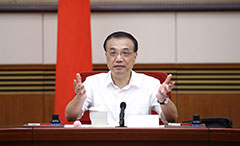State Council pushes forward VAT reform
2017-11-03
english.gov.cn
The State Council executive meeting on Oct 30 passed a draft that abolishes provisional regulations on the business tax and amends them for value-added tax (VAT), which was aimed at proceeding with VAT reform.
As an important part of fiscal and taxation reform and tax cut measures, the VAT reform has exerted multifaceted positive effects, with tax savings totaling 1.7 trillion yuan ($257.50 billion) since the implementation of its pilot program.
Additionally, four VAT brackets were streamlined into three, with corresponding tax rates of 17 percent, 11 percent, and 6 percent. Tax rates for farm produce, tap water, and audio-visual products were transferred from the previous 13 percent to 11 percent.
Consolidating and amplifying the considerable VAT reform accomplishments entail a legal enshrinement by amending regulations. “The annulment of the provisional business tax regulations and the amendment to VAT regulations legally reflected the VAT reform achievements and laid the foundation for further efforts to advance VAT reform and its legalization,” said Zhang Bin, a researcher at the National Academy of Economic Strategy of the Chinese Academy of Social Sciences (CASS).
At a seminar on advancing VAT reform held by the State Council, experts proposed legalization on the basis of a further amendment to current provisional VAT regulations.
Having become the primary tax type, an increasingly regulated and sophisticated value-added tax is due to exert more far-reaching influence on China’s economy and society.
According to a report recently published by the Chinese Academy of Fiscal Sciences, it is advisable to comprehensively categorize, integrate, and amend related existing tax policies for the sake of tax collection and administration.
“An improved VAT reform will help establish a modern VAT system that is fairer, simpler, and more efficient. This new system can further optimize the allocation of market resources, raise the efficiency in tax collection and management, and boost the global competitiveness of China’s tax system,” said Hu Yijian, a dean at Shanghai University of Finance and Economics.

